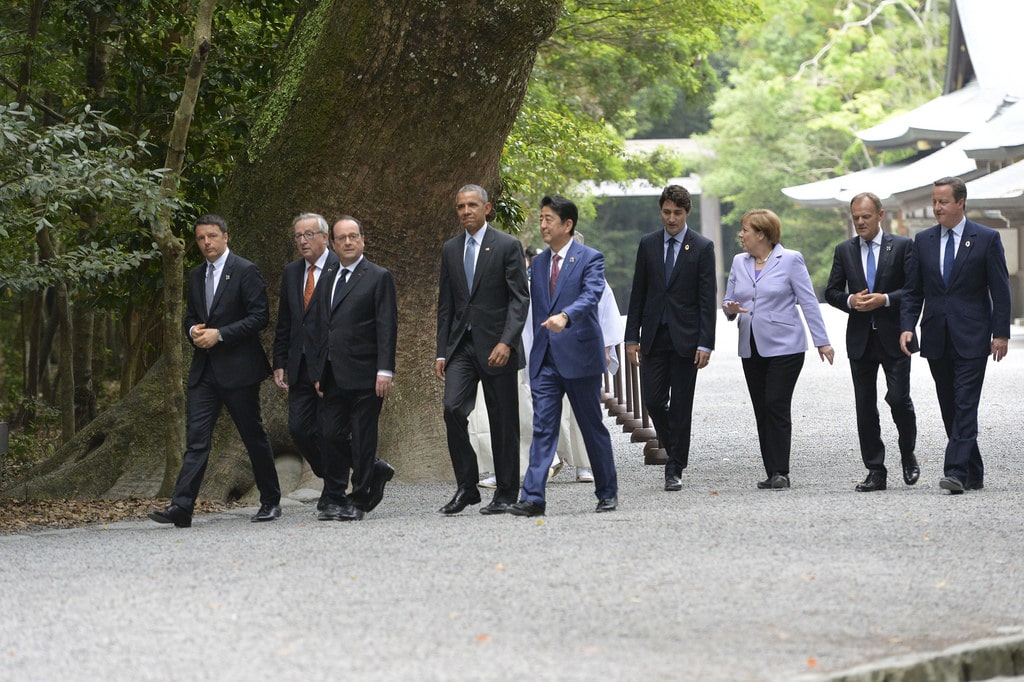How do you successfully phase out fossil fuel subsidies in less than 10 years? The first step would be identifying what a subsidy actually is.
And if you’re the British Government, you might be patting yourself on the back for a job well done because according to the Department of Energy and Climate Change (DECC) “the UK has no fossil fuel subsidies.”
So it seems that when the G7 nations committed to the “elimination of inefficient fossil fuel subsidies” by 2025 at the summit in Japan last week, the UK had already achieved this goal.
You’d be forgiven for scratching your head and asking how this is possible with a government constantly giving tax breaks to the oil and gas industry. And you’d be right, it’s not.
But because the G7 commitment does not define what a subsidy is, the UK is free for the time-being to use its very specific definition for fossil fuel subsidies.
“To be honest, the UK definition is nonsense,” said Shelagh Whitley, research fellow at the Overseas Development Institute. Whitley is responsible for producing an annual report on fossil fuel subsidies.
“Not only is it extremely narrow in contrast with other definitions that it has signed on to through the World Trade Organization and other places, but it is also not the same as the definition that it uses for renewable subsidies.”
Let’s break this down.
According to an August 2015 response by DECC to a freedom of information request: “The UK defines fossil fuel subsidies as government action that lowers the pretax price to consumers to below international market levels. The UK has no fossil fuel subsidies.”
The emphasis here is on the cost to the consumer as opposed to the production of fossil fuels.
If we applied this same definition to renewable energy, UK solar and wind power would not technically be subsidised because these are supported through levies on consumers.
“Most renewable subsidies in the UK actually increase cost to the consumer,” explained Whitley, “and the government loves to talk about how big those are [when defending renewable subsidy cuts]. So it’s hypocritical even in its own energy subsidy definitions.”
International Definitions
Focusing back on fossil fuels, up until recently G20 and G7 had a similar consumer-focused approach to subsidies, with a caveat limiting targets to subsidies that lead to wasteful consumption. This caveat however is no longer included in the G7 statement put out last week, opening it up to both consumption and production targeted subsidies.
Using this broader focus, research by ODI made headlines last November when it found that the UK Government gave £6 billion a year in subsidies to the fossil fuel industry – almost twice the financial support provided to the renewable energy industry.
Not only that, but the UK was the only G7 country to actually increase its fossil fuel subsidies between 2014 and 2015.
The UK Government continues to give tax breaks to boost North Sea oil and gas drilling. Photo via Enrico Strocchi / Flickr
Most of this came in the form of tax breaks to help boost North Sea oil and gas production. And if you’ll remember, in March the Treasury announced a further £1bn in tax breaks for companies operating in the North Sea.
Fracking companies can also expect some pretty generous tax breaks as Energydesk revealed last week.
But according to the government’s definition above, tax breaks for fossil fuels aren’t subsidies (they don’t target the consumer).
So how did ODI calculate its whopping £6bn figure? It used the World Trade Organization’s (WTO) definition of a subsidy, which includes “any financial contribution by a government … that confers a benefit on its recipient” such as spending by government, tax breaks, and government guarantees.
Some other international definitions come from the OECD and the International Energy Agency (IEA).
The OECD includes the impact of “all forms of market price support involving transfers between consumers and producers created as a result of policy such as government interventions on tariffs”, which would include applying lower than normal tax rates.
Meanwhile the IEA’s definition includes “any government action that concerns primarily the energy sector that lowers the cost of energy production, raises the price received by energy producers or lowers the price paid by energy consumers”.
As you can see, things get pretty “wonky” pretty fast, as Whitley put it.
UK Fossil Fuel Support
“I think the way that we would cut through all of that,” she said, “is that we need to keep now, probably three quarters of the fossil fuel reserves in the ground. That’s agreed. It’s the principle under which the Paris Agreement was signed, and that the UK has signed on to, and that means we have to stop producing fossil fuels.
“That means governments should not be supporting the production. Whether that support is defined as a subsidy or not doesn’t matter. This is UK taxpayer money and UK government resources that are being used to support fossil fuels.”
She continued: “Whichever number you choose to look at [whether it’s the WTO, the OECD, IEA or IMF’s calculations for UK subsidies], it’s not zero.”
This issue hasn’t gone unnoticed though. A few years ago the UK’s Environmental Audit Committee called the government out for denying that it subsidises the fossil fuel industry.
In the committee’s November 2013 report into energy subsidies, it concluded: “There is no single internationally agreed definition of what constitutes energy subsidy, which has provided a way for the Government to reject— erroneously, in our view—the proposition in some areas that it provides energy subsidies.”
The report hit out against government support for the North Sea and fracking, both of which it says constitutes a subsidy “despite the Government’s assertion otherwise”.
As it goes on to explain, the various definitions “also allows it [government] to claim that it has no ‘harmful’ or ‘inefficient’ subsidies—those in the firing-line of the UN Rio+20 Summit and the G20— despite fossil fuel consumption contributing to our greenhouse gas emissions.”
Finally, we can’t forget the UK’s overseas support for fossil fuels.
Between 2014 and 2015 UK foreign support for fossil fuels totalled £6.3bn according to ODI‘s research.
As the Environmental Audit Committee argued: “With overseas aid often globally directed at countries which also have fossil fuel subsidies, and export support going to fossil fuel projects, DfID [Department for International Development] and UK Export Finance should assess how UK support in these areas correlates with fossil fuel subsidies in support-recipient countries and set out why continued support in each case overrides the need for eliminating fossil fuel subsidies.”
Basically, “it has to stop,” Whitley argued. “UK domestic support has to stop and the money the UK is sending overseas has to stop too.”
“[The UK Government] has to start cleaning up its own activities. If it doesn’t set an example for the rest of the world, we’re in deep trouble.”
Photo: Number 10 via Flickr
Subscribe to our newsletter
Stay up to date with DeSmog news and alerts







